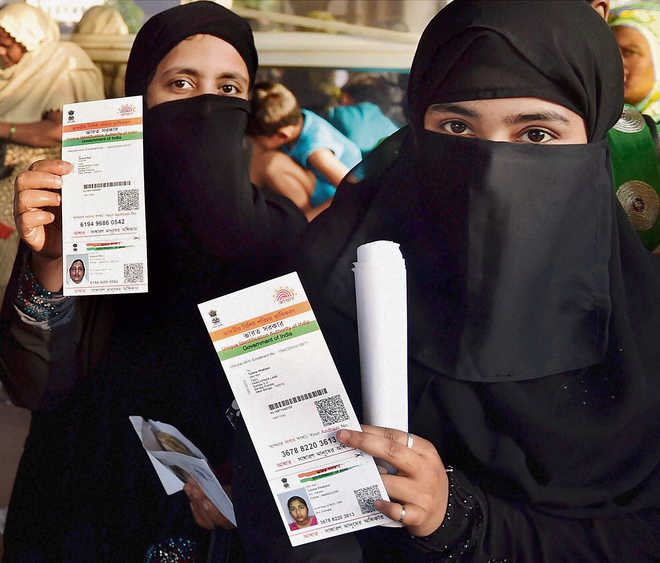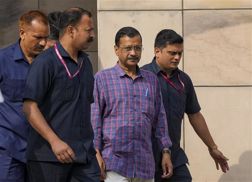
SN Misra
Teacher of constitutional law
By extending the Aadhaar linking deadline, the Supreme Court has put a stop to a spate of cases which are in the pipeline, questioning Aadhaar linking to the larger issue of right to privacy. In June, 2017, two judges had upheld validity of provision of Section 139AA (1) of IT Act, that has made it mandatory to mention Aadhaar ID with PAN card. The court had, however, cautioned the government to take proper measures to "...assuage public apprehension about data leakage by taking proper measures to instill confidence amongst the public at large."
Data protection of individuals from the predatory eyes of the government, in the guise of state security, has been a predominant concern for citizens. The Justice Srikrishna Commission, which was appointed by the NDA government to bring up a data protection framework, has brought out seven principles for a good data protection law. They include a technology agnostic law, informed and meaningful consent, accountability of data controller, statutory authority for enforcement, and penalties for wrongful data processing. The document tries to balance the rights-based model of the European Union, imposing many obligations on the organisation processing data, with the US model which seeks to protect the individuals from excessive state regulation, but recognises the value of data to encourage innovation. The commission noted the criticism of the Aadhaar scheme, which though seemingly voluntary, has become mandatory in practice and has been viewed by many as a "enforced" collection of personal data by the state.
In August 2017, the Supreme Court gave a landmark judgment on the right to privacy as a fundamental right. It overruled its judgment in MP Sharma and others vs Satish Chandra, District (1954) and Kharak Singh vs State of U. P. & others (1962) where the court had ruled that right to privacy cannot be read into provisions of Article 20(3) of the Constitution. The Supreme Court has now ruled that privacy is a constitutionally protected right, which emerges from the guarantee of life and personal liberty. Privacy is the constitutional core of human dignity and includes preservation of personal intimacies, the sanctity of family life, marriage, procreation, the home and sexual orientation, including "a right to be left alone". Personal choices governing a way of life are intrinsic to privacy, as it protects heterogeneity, plurality and diversity of our multilingual culture.
The court noted that the privacy claims cannot be absolute. A reference was made to the USA, where the concepts of "compelling state interests" and "narrow tailoring" were evolved before any state interference in to personal privacy takes place. Justice Jasti Chelameswar had observed that since compelling state interests had no definite contours in the USA, it is critical that "this standard be applied with some clarity as to when and in what types of privacy claim it is to be used". Only in privacy claims which deserve strict scrutiny, the standard of competing state interest is to be used.
Justice Rohinton Fali Nariman, alluding to international convention and declaration to which India is a party, averred that right to life and liberties are "inalienable". For him Article 21 is "inalienable" as they "inhere in every person by virtue of in fact that he or she is a human being". The judgment also overruled the judgment in ADM Jabalpur vs SS Shukla (1976) where the majority of judges had upheld suppression of right to life during the imposition of emergency provision as constitutionally valid. Justice Sanjay Kishan Kaul had famously observed that the "majority opinion in Jabalpur case must be buried ten fathom deep, with no chance of resurrection". It is, therefore, quite clear that the right to privacy judgment has assiduously defended right to life, liberty and privacy, except in cases which involve "compelling state interests", for which proper standards would need to be put in place.
The NDA government has been trying to make maximum use of Aadhaar card by invoking the trinity of JAM (Jandhan, Aadhaar & Mobile), so that the subsidies and benefits to the poor households are properly targeted. The Economic Survey (2016-17), however, brings out how 41 per cent of subsidised urea gets diverted to non-agricultural uses and smuggled abroad, while 24 per cent of its get consumed by the rich farmers. Only 35 per cent of the Rs 49,768 crore fertiliser subsidy (2018-19) reaches the intended beneficiary of small and marginal farmers.
Chief Justice Dipak Misra in the recent order has observed that the government has enough piecemeal notification and legislations issued in recent years to link one service to the other and the need to have a sense of certainly to pervade so that the citizens would not be harmed or their services be curtailed under the Aadhaar scheme.
In the present ruling, the linkage under Section 7 of the Aadhaar Act 2016 would remain undisturbed, under which subsidies, benefits or services funded out of Consolidated Fund of India are transferred. Therefore, the extension to deadline of Aadhaar linkage would apply to financial services like bank accounts, mobile phones and passports. Justice DY Chandrachud has observed that "we can't let a state of uncertainty to prevail over the entire financial system". P. Chidambaram arguing against the linking, also drew attention to the Aadhaar Act passing as a money Bill, bypassing the Rajya Sabha, which represents state interest and was thus against the concept of federalism.
In the MP Sharma Case (1954), the aggrieved had challenged constitutionality of search and seizure of documents as being violative of Article 19(1)(f). In the Kharak Singh Case (1962), the challenge was against surveillance by the state as it infringed Article 19(1)(d). In both these cases, the SC had ruled that right to privacy is not guaranteed in our Constitution, as has been the case in the USA through the Fourth Amendment. SC has, therefore, come a long way in asserting right to privacy is part of right to life. It has also brought a considerable degree of certainty and comfort to the citizenry that the state will not further insist on linking their personal records like bank accounts, mobiles and passports till the larger issue of Aadhaar violating right to privacy is addressed.
The SC has ensured that right to dissent and privacy in a democratic society are inalienable fundamental rights of its citizens.


























